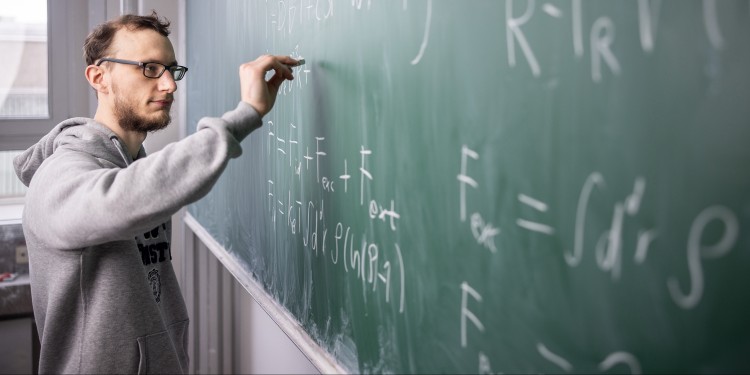
Stay curious, and carry on asking, when others switch off
It is a Tuesday evening in late April, and Room 102 at the Volkshochschule (Adult Education Institute) in Vagedesstraße in the small town of Ahaus, 50 km from Münster, is filling up. Shortly before 7:30 it becomes clear that there are not enough chairs. Volkshochschule staff quickly provide more seating until the 40 or so people present have all found somewhere to sit. The audience now waits for the start of the first in a series of three talks entitled “From Physics to Philosophy at the Origins of the Universe”. The speaker comes from the University of Münster, and his name is Dr. Michael te Vrugt.
He is 27 years old and, as things stand, will soon have his second PhD – in Philosophy. He already has one PhD, in Physics. His Physics dissertation, which he completed in 2022 under the supervision of Prof. Raphael Wittkowski at the Institute of Theoretical Physics, was the best in his year – as was his master’s thesis before that. It almost goes without saying that te Vrugt, who was born in Stadtlohn and attended the Gymnasium (grammar school) in nearby Ahaus, had the best Abitur result of his year.
A flashback to one day a few weeks before his talk: we are in the coffee room at the Institute of Theoretical Physics, and Michael te Vrugt is sitting on a sofa with a rucksack and cycle helmet at his feet and a cardboard tube containing a scientific poster. Right after our meeting he wants to go to a colleague’s dissertation defence – one of the many dates in his diary. One thing becomes apparent as he talks about his work, about the reasons for his balancing act between the Natural Sciences and the Humanities, and about his hobbies: showing off is not his thing.
When he was at primary school te Vrugt wanted to become a tractor driver. “I’m a country lad,” he says. But this aim disappeared pretty quickly, giving way to the next one: he wanted to be a professor. He can’t remember now how the idea occurred to him. After his Abitur he began studying Physics, with Philosophy as a secondary subject – which would only have lasted for two semesters, but he enjoyed Philosophy so much that he stayed with it. “When you study Philosophy you have a lot of freedom. As a result, I was easily able to fit in the lectures and seminars around the rigid Physics timetable,” he recalls.
Michael te Vrugt has his office in the Center for Soft Nanoscience, but occasionally he has work to do at the Institute of Theoretical Physics and in the Department of Philosophy, or he works from home – which he likes doing in the evening or at night. Has he ever felt that the two courses of study – and the two PhDs – were stressful? “Sure, sometimes it was hard work.” he replies, “But it stresses me even more if I always have to do the same thing. So it was more of a welcome diversion.” During his studies he invested a lot of time in his work as a member of the departmental student body; today he performs regularly as a trumpeter in a brass band, is active in the Schützenverein (marksmen’s club) in his hometown and is an enthusiastic Quidditch player. This relatively new sport is based on the fictitious team sport of the same name from the Harry Potter books. Recently, along with the team from Münster University Sports, te Vrugt took part in the European Quidditch Championships in Golbey, in eastern France.
In his dissertation on statistical physics he examined the behaviour of systems containing a large number of moving particles. The spread of Corona viruses – dependent on the distance people maintain from one another – is one example of this. The expansion of the universe is another. Taking a mathematical approach used for the purpose for the first time, a team with Michael de Vrugt developed a model in which an uneven distribution of the mass in the universe was examined. The central question in the various pieces of work undertaken – across the different length scales – was: How does the state of a system change over time? Michael te Vrugt’s list of publications already contains more than 20 papers in scientific journals, some of them highly prestigious.
But why Philosophy on top? “Physicists stop asking questions at the point at which you could continue asking,” te Vrugt replies. “Why,” he asks, giving an example, “do we never observe a coffee cup warming up again by itself? According to the laws of physics, it would be possible. Physicists explain it by saying that – looking at the question statistically – it is much more probable that the coffee cools down. Philosophers aren’t satisfied with that but question, rather, the definition of probability.” Michael te Vrugt is writing his second PhD under the supervision of Prof. Ulrich Krohs and Dr. Paul Näger at the Department of Philosophy, examining the question of why, in physics, there is a clear direction in which time moves.
Back to Ahaus. After the applause at the end of the talk, the head of the Volkshochschule, Dr. Nikolaus Schneider, says goodbye to the audience and the speaker. In his introductory words he had told the listeners about a particularly well-attended talk on philosophy at the Volkshochschule. The talk was given a good ten years before, and the subject was Immanuel Kant. Schneider recalled that there was a teenager in the audience who came to his attention “because of the many clever questions he asked”. That young man was Michael te Vrugt.
Author: Christina Hoppenbrock
This article is from the university newspaper wissen|leben No. 3, 3 May 2023.
